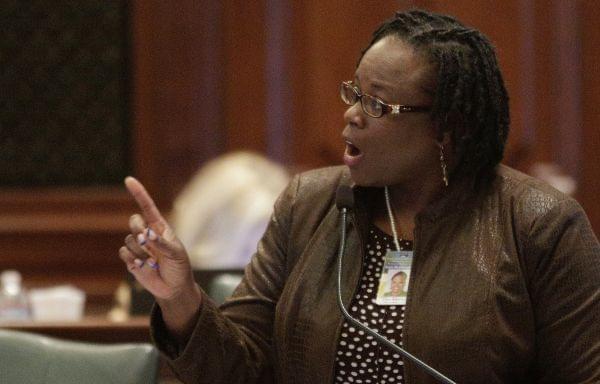Lawmaker Concerned About Continued Criminalization Of Cannabis In Illinois

State Rep. Carol Ammons (D-Champaign), speaking on the Illinois House floor in 2016. Seth Perlaman/AP
State Representative Carol Ammons said she didn’t vote on a historic bill to legalize the use and sale of cannabis in Illinois because she didn’t have a chance to express her concerns about the legislation.
The measure passed out the legislature last week – and Governor J.B. Pritzker said he plans to sign it.
But Ammons, an Urbana Democrat, said she’s concerned that people will still be charged with cannabis offenses under the new law.
The legislation allows Illinois residents 21 and older to possess up to 30 grams of cannabis beginning next year. The bill also allows for the pardon and expungement of misdemeanor convictions for possession of up to 30 grams. Those convicted of possessing larger amounts will have to petition the courts to remove those convictions from their records.
Illinois Public Media spoke to Ammons about her concerns around the legalization legislation.
This interview has been lightly edited and condensed for clarity.
What are your major concerns about the legislation?
I think it's a step forward in the right direction, but it does not completely legalize marijuana in the state of Illinois. There are still penalties involved and included in this bill that could result in criminal action against people who may not understand what legalization actually means in implementation form. And so I was really concerned about that, and I wanted to make sure that the public understood that the bill itself still included points where criminalization could take place.
Can you elaborate on those points?
If you're caught with 31 grams or above, there's still penalties included in the legislation. So you can still get a misdemeanor, you can still get a felony as a result of possession. And I was very concerned about that point.
You've previously expressed concern that people who were charged with additional crimes at the same time that they were charged with a cannabis offense, that those individuals wouldn't be eligible for automatic expungement under this legislation.
If a person has a possession charge and another charge, some other crime that they're being charged with, the marijuana can enhance their sentencing. And so I felt strongly that even if a person received a charge for theft, burglary or any other thing related to a marijuana possession charge, I thought that that enhanced sentencing needed to be reduced based on the marijuana piece.
And then of course, from that point, they would be still charged with whatever they were charged with (in the other crime). In this case, they're not eligible for the automatic expungememnt (for possession) over the 30 grams. And in order to get that consideration, a person has to go through the entire petitioning process. To me, that is not automatic expungment. And certainly that really hinders the process of legalization in my estimation.
And what about the social equity measures included in the bill?
Those are yet to be seen. We certainly hope that the social equity provisions that were put into this bill are successful, and those who are interested in being entrepreneurs in this new industry really have an opportunity under the social equity framework that was included. So I'm hopeful that those things will be effective.
The good thing about the legislation, though, is assuming that it doesn't work the way that the legislature and the governor expects that it will work, that there is a stopping period on the licensing provisions. That will allow us to then go back and look at the disparity issue.
This is an historic piece of legislation. What was it in those final moments that convinced you that you couldn't vote in support of it?
I think, ultimately, my expression of my constituents' issues on both sides of this issue needed to be put on the record, and not being able to do that prior to the vote made me say, 'well, you know what, this is not something that I can go forward with.' It was important that our constituents' voices were heard at that time.
Follow Lee Gaines on Twitter: @LeeVGaines

